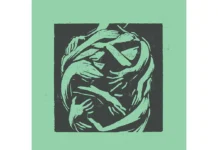Two years after their most personal and introspective album to date, “Kulkija,“ folk metal giants KORPIKLAANI are back with a new full-length studio effort, “Jylhä,” to be released on February 5th, 2021, via Nuclear Blast Records. The band’s eleventh record goes hand-in-hand with a lineup change: drummer Samuli Mikkonen now joins their ranks… all the more reason to check out what this album has to offer us!

While “Jylhä” is difficult to translate, it’s mostly used to describe landscapes as rugged, wild, or can be used as majestic, which makes it truly the perfect title for this album. In stark contrast with its predecessor “Kulkija,” “Jylhä” is a wild album, filled with diverse songs that range from fast and heavy to the upbeat party songs that KORPIKLAANI have been putting out throughout their career and of course, a few touching, emotive moments.
For the majority of his career, frontman Jonne Järvelä has been writing the material for KORPIKLAANI by himself. It’s no wonder that having found a second songwriter in Samuli Mikkonen, with whom he can bounce around new ideas, was what KORPIKLAANI has needed for a while now. “Jylhä,” as a result of a collaborative effort in songwriting, is KORPIKLAANI‘s strongest effort in a while, and no wonder, as there is a little bit for everyone on this album, which creates a bridge between their earlier material and a more matured sound.
Thundering drums open the album in “Verikoira,” a kick-ass heavy metal song of which the main inspiration was JUDAS PRIEST‘s “Painkiller.” Blast-beats, heavy guitar riffs, and on top of that, the beautiful folk melodies make this a killer track and powerful opening. This song has a whole lot of things going on and also shows Jonne Järvelä‘s strong, folk-influenced vocals, and even throat singing. One section of this track reminded me a little bit of Finnish thrash metal act STAM1NA, especially in the dual high-pitched and strong backing vocals. Next single “Niemi” tells the story of the Bodom murders, a Finnish unsolved true crime murder mystery. While the story and lyrics are pretty dark, the song is actually a fun upbeat, fast-paced listening experience that blends in elements from power metal with beautiful melodies, an enchanting violin melody.
It’s no wonder that KORPIKLAANI picked out “Leväluhta” as a single – the relaxed track that mixes in the laidback atmosphere of genres like reggae with folk metal, an interesting mix of sounds that serve as a bridge towards the mid-paced “Mylly.” Out of all the tracks, this song is perhaps mostly focused on the storytelling aspect of music, which is especially clear in the powerful vocals by Jonne Järvelä. The lyrics tell of a Finnish folklore story of a man’s journey to the mill where he sees a “devil” figure. Reflective in nature, the song feels like a powerful statement with emotional violins that create a somewhat melancholic atmosphere.
The band continues the somewhat slower pace with the ballad “Tuuleton,” which starts off soft and mellow but gains strength as it progresses. Midway through, there is a somewhat surprising progressive section, started off by violin riffs, after which the song reprises again, with very rhythmic heavy riffs. It’s elements like these that make this album more refreshing than its predecessor “Kulkija,” as every song is very layered and has a lot of surprises included.
“Sanoton maa” is perhaps the catchiest track on this album, with a powerful hooky chorus that is meant to get your hands waving during a live show and even those whose native language isn’t Finnish might be spurred to sing along to the lyrics of this song. “Kiuru” starts off with pounding drums and an incredibly groovy bass line, but then surprisingly changes to a mid-paced track with a lot of heaviness in the guitar lines and drums. Building up to its chorus, the track changes its tempo and it becomes heavier and heavier, more interesting every second it progresses. The many time signature changes might fool you into thinking that KORPIKLAANI has changed to a folky progressive metal band.
“Miero” is a bit more of a traditional KORPIKLAANI song that serves its purpose as a breather before the fury of “Pohja” begins. “Pohja” begins like a seemingly mid-paced standard folk track, but after the first 30 seconds there’s a little break, after which a fast folk extravaganza begins. It’s one of the more festive songs on this album and definitely a light in these dark times. “Huolettomat” (“carefree”), is as cheerful as “Hakuna Matata,” it’s a happy-go-lucky track, that leaves you with a warm feeling inside. The great part is that midway through a soft beautiful bass line introduces a more mellow section that creates depth to this otherwise party track.
The atmosphere changes with the more classic track “Anolan aukeat,” a somewhat more traditional song structurally, with an impressive accordeon solo. Again, it feels like this track was placed before an especially fun track just to leave some room for the audience to breathe for a second after intense partying. “Pidot” is the album’s drinking song and let me tell you, it’s a lot of fun. It’s a surprise, even for KORPIKLAANI, blending a bit of bluegrass into their blend of folk metal. The verses feel a bit like a conversation between the band members and altogether it’s a delightful track, filled with soul and a lot of beats to dance to. Interestingly enough the banjo is provided by Jack Gibson, bass player of the legendary thrash metal act EXODUS, under the moniker of “the more the merrier.”
The album ends with “Juuret,” a somewhat darker song, with strong, memorable choruses. Towards the end, a drum solo introduces another section that drives the song to its final push. I believe the album ends perfectly with this somewhat broody track, as it lingers for a while after its done.
Altogether, this album shows a very refreshing side of KORPIKLAANI, where a lot of new, refreshing elements have been blended in their somewhat reinvented sound. This might just be their best studio effort since “Manala.” There are plenty of things that are very inspiring, take for instance the backing vocals; while not something that I usually pay attention to, in “Jylhä” it seems like they created an extra dimension into the many different detailed layers of their songs. Then there is a case to be made about the somewhat more progressive side of many of these songs, playing with different sections, changing tempos, and focusing on other genres than the standard humppa that we are already so familiar with.
Now, the drums on this album are so good that they require their own paragraph in this review. Those who are not familiar with drummer Samuli Mikkonen and his previous band PROFANE OMEN might not know how incredibly diverse he is as a drummer. In PROFANE OMEN, drums were also an essential part of the sound and he has continued that same energy with KORPIKLAANI. In fact, they are what makes the songs playful and refreshing, but also heavier when the song requires it.
“Jylhä” is incredibly diverse, containing songs that will both please newer fans of the band, as well as those fans who love their party songs. It’s no wonder KORPIKLAANI released so many singles prior to the album release, as all of these tracks are strong, different, and represent various aspects of the record. That leaves me saying to fill up your pints and once you’re feeling saddened by the burden of the pandemic, put on KORPIKLAANI‘s “Jylhä,” the perfect medicine against any melancholy.
Tracklist
- Verikoira
- Niemi
- Leväluhta
- Mylly
- Tuuleton
- Sanoton maa
- Kiuru
- Miero
- Pohja
- Huolettomat
- Anolan aukeat
- Pidot
- Juuret
Lineup
Jonne Järvelä – Vocals & Acoustic Guitar
Sami Perttula – Accordion
Tuomas Rounakari – Violin
Jarkko Aaltonen – Bass
Kalle “Cane” Savijärvi – Guitar
Samuli Mikkonen – Drums & Percussion
Label
Nuclear Blast Records





